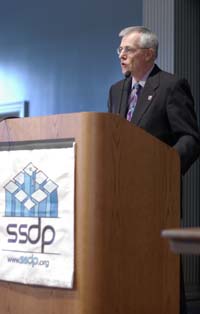A 79-year-old widow’s cottage is raided for growing tomatoes in the window boxes.
Mrs Matheson told the Daily Mail: “I got a terrible fright and I couldn’t understand what they were doing here because I knew we had nothing more than tomatoes in the window. I don’t know what the neighbours must be thinking.”
Her 47-year-old son Gus, a former driver, was looking out of the window when he saw police cars stop outside.
He said: “I wondered what on earth was going on. I opened the door and they more or less barged past, saying that I was growing cannabis on the windowsills.
“I started laughing because I knew they were tomato plants but it wasn’t so funny when they frisked me and then started tearing the house apart.”
Mr Matheson said he was held in the bedroom while officers searched the furniture and under the mattress. He also said that the police impounded the family’s pet dogs.
“They even ‘arrested’ Zac, our black labrador, and Moby, our Jack Russell, putting them in the back of one of the cop cars,” Mr Matheson added.
“And I just couldn’t believe it when they brought sniffer dogs all the way from Alness, which is about two hours away.”
Apparently the police everywhere now automatically assume that anything that looks like a plant, with stems and leaves, is cannabis.
There do appear to be some differences in the drug raids between the UK and the US. In the former, they apparently arrest the dogs, instead of shooting them. (I guess maybe over there they get a trial, first?) And, in the UK, they barge past you, instead of slamming you to the floor and handcuffing you in your dogs’ blood.
But neither country has the slightest understanding of freedom.



